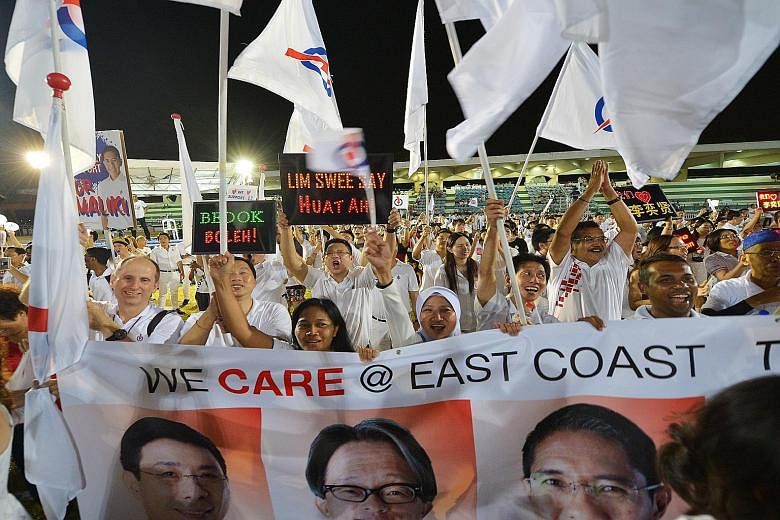An hour after polls closed on Sept 11, the usually reticent Workers' Party (WP) chief Low Thia Khiang gave a rare impromptu interview outside his town council office in Hougang.
Seated on a bench and with one arm draped over the backrest, he told The Straits Times that the party "should be able to retain" Aljunied Group Representation Constituency (GRC) and that he believed it was doing "all right" in the contest to retain the Hougang and Punggol East single-seat wards.
Meanwhile, Manpower Minister Lim Swee Say was holed up in the People's Action Party's (PAP's) Bedok branch in New Upper Changi Road for what looked like a long night ahead.
His East Coast GRC teammate Lee Yi Shyan was visiting counting centres to get a picture of how the vote was shaping up in a GRC that some analysts had believed could be the next to fall to the WP.
The contrasting sense of confidence on the one hand, and apprehension on the other, mirrored the sentiments of the opposition and the ruling party as they headed into General Election 2015.
Many in the opposition camp, as well as among political watchers, saw the election as one in which the WP would build on its gains in GE2011. And they believed the electorate's yearning for greater political diversity in Parliament would continue unabated.
But in the early hours of Sept 12, the faces told a different story.
The PAP romped home with 69.9 per cent of the national vote - a 9.8-percentage-point upswing from its 2011 showing, and its best performance since GE2001.
Opposition leaders put a gloss on their performance, with Mr Low pointing out that the WP's net loss was just one seat - Punggol East.
But Reform Party chief Kenneth Jeyaretnam was caustic in his assessment of the outcome, telling reporters that "Singaporeans get the government they deserve, so I don't want to hear any complaints".
ELECTION SEASON
The year began with the air thick with speculation that an election was on the cards. Just a month earlier, in December, Prime Minister and secretary-general Lee Hsien Loong primed the party faithful at the PAP's 60th anniversary and party convention, saying that the next election would be "a deadly serious fight", and underscored the need to put a team in place to take the country forward.
The Government's Budget in February, which proved to be the last before the general election, held more clues. The more apparent shift to the left in social policies underlined what Deputy Prime Minister and then Finance Minister Tharman Shanmugaratnam described as major initiatives taken in recent years to empower Singaporeans at each stage of their lives.
Meticulously planned Golden Jubilee celebrations and the mood generated - tempered by the spontaneous outpouring of grief at the death of founding prime minister Lee Kuan Yew in March - were developments that combined to suggest that it was a question of when, not if, the election would be called.
Yet it was still far from certain how the PAP would fare. It was bruised by the outcome of GE2011, when it had its worst electoral showing since Independence with 60.1 per cent of the vote share, and lost a GRC for the first time. But the setback prompted soul-searching within the party, as well as a systematic addressing of the GE2011 hot-button issues of housing, transport, cost of living, and population and foreigners by the Government.
The party's approaches changed in other ways: greater use of social media; spending a longer time with residents; and having potential candidates on the ground much earlier than previously so residents can assess and be more familiar with them.
OPPOSITION BUZZ
The opposition, on the other hand, appeared confident of keeping the momentum from 2011 going, and contested all electoral seats for the first time since Independence in 1965.
The parties attracted candidates with strong qualifications like consultancy firm chief executive Leon Perera, who was at Oxford on a government scholarship and graduated with double first-class honours; National University of Singapore sociology professor Daniel Goh; and medical professor Paul Tambyah.
It suggested that the opposition's ability to attract a different calibre of candidate, as seen in the previous election, was no fluke.
The Singapore Democratic Party (SDP) launched its election campaign early - in January - and was buoyed by the return of secretary-general Chee Soon Juan. With his defamation suit out of the way, he could contest his first election since 2001 and presented a softer, more moderate image.
The Reform Party generated interest with its recruitment of three Speakers' Corner regulars: rights lawyer M. Ravi, blogger Roy Ngerng and career counsellor Gilbert Goh.
But the focus remained on the WP, the only opposition party with elected MPs, and whether it would claim another GRC. It evidently believed it could, and assumed that Aljunied GRC was safe.
The WP's incumbents, its "A-Team", did minimal campaigning there, choosing to focus instead on helping to bring in the votes in the other constituencies where the WP was contesting - in particular, in East Coast GRC.
The approach almost cost them. It took a recount, after which anxious supporters learnt that the team retained Aljunied GRC by the skin of their teeth: with just 50.96 per cent of the vote.
Was the WP's showing the result of misreading the ground, and an overestimation of the electorate's appetite for opposition growth?
Party leaders, usually guarded and cautious, had begun talking openly about having at least 20 opposition MPs, so as to be an effective check on the Government.
In the wake of the results and as the WP, like others, continues its post-mortem, it will have to assess whether its ambitions, including that of developing a stronghold in the eastern part of Singapore, proved to be too much of a target for the electorate to stomach.
THE ROAD AHEAD
The nine-day election campaign was documented and instantly uploaded via smartphones. No moment was spared - whether it was a PAP candidate's enthusiastic fist pumping, or an opposition candidate catching himself just after urging the crowd to vote for the ruling party.
But the lasting legacy of GE2015 goes beyond such episodes.
The election has, arguably, cast a new perspective on GE2011 - which was labelled far and wide as providing the first steps in a gradual but inexorable move towards a two-party system that mature democracies are supposed to have.
But perhaps everyone was too quick to declare the beginnings of a "new normal" for politics here.
There is agreement among political watchers that in 2011, voters used the election to signal their displeasure with a range of policies by voting against the PAP. It is less clear if the outcome meant that they accepted the opposition's argument about needing a sizeable presence in Parliament to provide checks and balances.
What is certain, however, is that Singaporeans recognise that the power to pass judgment on the performance of the Government, or on political parties competing for their attention, rests squarely with them.
On Sept 11 this year, voters told the PAP just what they thought of its policies, plans and performance.
And to be sure, they also sent a similar message to the opposition parties.


